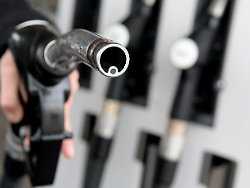Politics sees different ways
What to do against high fuel prices?
By Sebastian Schneider
03/14/2022, 5:19 p.m
Since Russia’s invasion of Ukraine, fuel prices at German gas stations have skyrocketed. Representatives from all political directions call for relief for consumers – and present different concepts. An overview.
Petrol and diesel have never become so expensive in Germany so quickly. Kremlin chief Vladimir Putin’s war in Ukraine, the rise in oil prices and the threat of a boycott of Russian gas and oil are driving up prices. Even if they are now stagnating at a high level, politicians are discussing various measures to relieve consumers.
“A fuel price brake, it’s needed now!”, Saarland Prime Minister Tobias Hans called for action last week. The CDU politician made his claim in a selfie video in front of a gas station on Twitter. Only days later did he make it clear how he had imagined the measure. “Starting from the current 2.15 euros for a liter of Super E 10, we can achieve a price of 1.62 euros per liter with a fuel price brake, i.e. 53 cents cheaper than at present,” said Hans of the Düsseldorf “Rheinische Post”.
How does the fuel price brake work?
This would work with a reduction in VAT. According to Prime Minister Hans’ proposal, the tax on petrol and diesel would be reduced from 19 to 7 percent for a certain period of time. The last time this happened was in the first year of the Corona crisis, when VAT was reduced to boost consumption after the first lockdown. The Bavarian Prime Minister Markus Söder has also campaigned for such a reduction in VAT on petrol and diesel. “It is immoral for the state to profit from rising energy prices,” he wrote on Twitter.
On the other hand, Federal Finance Minister Christian Lindner considers the demands of Hans and Söder to be of little use. “If the Union calls for a so-called fuel price brake, then they have to say what they want to cut in the budget,” the FDP politician told the Berlin “Tagesspiegel”. “Or they have to admit that they are willing to take on new debts.”
He rejected the allegations that the state would enrich itself from high fuel prices. Because consumers only have a limited income, there is a shift in VAT, explained Lindner. “People then hold back with consumption elsewhere.” And the state then takes less there.
Lindner proposes a tank discount
The FDP politician has apparently opted for a different solution, the so-called tank discount. As the “Bild” newspaper reported, at least 20 cents per liter should be deducted when paying after filling up. After that, gas station operators could submit the receipts to the tax authorities and get the money back from the federal government. Even if the signs in front of the petrol stations show different prices, a liter of petrol or diesel shouldn’t cost more than two euros. However, those who travel a lot by car benefit most from this.
Lindner’s project is criticized by the petrol station association ZTG. “That would have literally been shot in the eye from behind,” said Managing Director Jürgen Ziegner. The implementation is the problem: A price deduction granted at the gas station is “highly bureaucratic”, emphasized the association. There is also criticism from the Greens. The tank discount is “too expensive, not very accurate, bureaucratic and behaviorally counterproductive”, wrote the Green Finance Minister of Baden-Württemberg, Danyal Bayaz, on Twitter.
Greens advocate energy money
Lindner’s proposal did not go far enough for the Green Federal Minister of Economics, Robert Habeck. He announced another relief package on Sunday evening, which should also help with the extremely high heating costs and electricity prices. Meanwhile, his party is returning to an older claim. Energy money must be paid out to all citizens as soon as possible, Greens leader Ricarda Lang told the “Bild” newspaper. “This means that everyone has more money in their account, and people with little money benefit the most.”
The Greens were already using the energy money to advertise in the election campaign for the last federal election. The sum paid out monthly should offset an increasing carbon price. This would create incentives for households to live in a particularly climate-friendly manner. The thinking behind it: If you consume less CO2 in your everyday life, the CO2 price will affect you less and you will have more energy money left over.
The energy money is also supported by Marcel Fratzscher, head of the German Institute for Economic Research (DIW). It is the best way to relieve people with low incomes quickly and precisely, said the DIW boss in the ARD. The state could pay households with an annual income of less than 50,000 euros 150 euros a month. On the other hand, higher earners in particular benefited from a cap on fuel prices or an increase in the commuter allowance.
